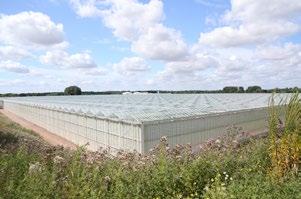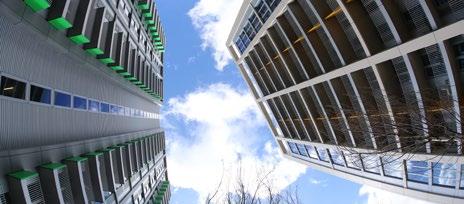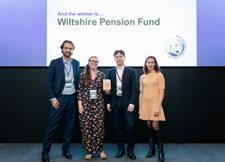




Welcome to Wiltshire Pension Fund’s Responsible Investment and Stewardship Highlights of 2023/24. In this report, we share examples and stories of the work we do in action, in order to bring our investments to life!
We also publish a much more detailed and comprehensive Stewardship report on our activities in this area, which is available on the website. This shorter report is designed to share some highlights, to make the information more accessible to a wider audience.
We hope you enjoy the report!
Responsible investment is the strategy to incorporate ESG (environmental, social and governance) factors into investment decisions.
We currently manage around £3.2bn of assets
It is the responsible allocation, management and oversight of capital to create long-term value for clients and beneficiaries leading to sustainable benefits for the economy, the environment and society (as defined by the Stewardship Code 2020).
ESG factors, including Climate Change, are important factors for the sustainability of investment returns over the long term. We need to protect the Fund’s assets, so that we have enough money to pay pension benefits as they fall due, and to help keep our employers’ contribution rates as stable and affordable as possible. That’s why we consider these factors –we are always trying to earn strong risk-adjusted returns, and ESG factors play an important role in helping us to do that.
Here are some examples of our achievements and areas of work during 2023/24:
We published our enhanced CLIMATE REPORT demonstrating the wide range of work we are doing to achieve net zero
We published a PLAN to divest from fossil fuels
We published our 2023 RESPONSIBLE INVESTMENT POLICY
We made progress implementing our innovative CLIMATE OPPORTUNITIES portfolio
We launched a CAMPAIGN FOR COP28 (the UN’s climate conference) explaining our approach to members, with a factsheet read by c.13k people
We joined one of our managers, Ninety One, in discussing our joint commitment to net zero, and the pivotal role of emerging markets in the transition
became an
with Pensions for Purpose, supporting us in investing with positive impact
We have continued to receive recognition for our approach – read more on page 20
We conducted a huge survey of our membership and employers on responsible investment issues – read more on page 18
We focussed on the important topic of EQUALITY, DIVERSITY AND INCLUSION
One of the most important ESG factors to consider is climate risk . When it comes to climate risk, the Fund’s goal is as follows:
In March 2021, in the Fund’s best financial interests, we made a decision to set a net zero by 2050 goal for the investment portfolios.
All of our climate risk work is based on scenario modelling, which enables us to put numbers around the risk, and make decisions based on what is the best financial outcome for the Fund.
We focus on our top emitters, to deliver maximum impact
We work with our investment managers to evolve their approach
We allocate money to renewable infrastructure and climate solutions
We have a plan to divest from all fossil fuels by 2030, and ensure all remaining holdings can transition
We investigate significant sectors, to ensure we are investing in forward-looking companies
We have developed a framework to understand our exposure to biodiversity risks
We transparently report on the work we have been doing
We measure our decarbonisation progress against a baseline of our carbon footprint as at 31 December 2019.
The fund’s baseline position for decarbonisation is calculated as follows: What has been included?
Calculation date: 31 DECEMBER 2019
Carbon footprint (tCO2e/$m investment – measures the emissions impact of a portfolio per $1m invested): 39.9 TCO2E/ $M INVESTMENT
We have set a target pathway to decarbonisation however we acknowledge that progress will not be a smooth journey. The following graph shows our targets, and our actual progress to date:
Target Actual Carbon Footprint
Although slightly behind target, our carbon footprint has reduced by 31% since we began our journey! You will be able to read more about our approach to net zero in our Climate and Nature Report 2024.
We have invested in a wide range of renewable assets, and have a target to increase this exposure. One such asset, which we hold in our secured income allocation (through a £100m portfolio of operational renewable assets, managed by Schroders Greencoat via the Brunel pool), is a collection of carbon neutral greenhouses, located in the South East of the UK.
Our visit to the greenhouse was an ideal way to discover more about our investment, hearing direct from the growers. This investment is an ingenious marriage of established technologies, enabling us to earn returns in a sustainable way, whilst promoting better outcomes for the environment and the British food economy.
Our exposure to carbon neutral greenhouses is £7m. These assets are targeting a return of >8%, which comes from Renewable Heat Incentive payments (a scheme which is now closed for new investments, but is secured for existing projects), and inflation-linked rental payments from the growers, who have signed 20-year leases. This leads to secure, long-term, sterling, inflation-linked returns for the Pension Fund.
As soon as we entered the greenhouse we were overwhelmed by the scale. The greenhouse we visited is the largest of its kind in the UK, at a staggering 12.5 hectares. Inside the greenhouse, 334,000 pepper plants grow up strings from tiny compost squares, where a calibrated amount of water, nutrients and CO2 is delivered by a system of pipes. Larger pipes encircle the rows of plants, providing heat to the greenhouse. A busy fleet of selfdriving carts head up and down the rows, entering the greenhouse empty and leaving full with a freshly picked harvest of peppers.
Rainwater is collected from the roof and last year this provided all the water needed for the plants. There are hives on site which provide the bees to pollinate the plant. And the CO2 for the plants is also produced on site
Inside the on-site energy centre, we learnt how the renewable heat is generated. At a nearby water treatment plant, once the water has been processed, clean water is released which is 6 degrees above ambient temperature. The energy centre uses heat pumps to boost this to 50 degrees C, and this water is then used to heat the greenhouse. The cooled water which is then released is better for local ecosystems. The heat pumps are powered by electricity generated by combined heat and power. The CO2 produced in this process is stored in a giant cylinder and used to feed the plants.



100,000 PEPPERS PER DAY
12.5 HECTARES
>8% INFLATION-LINKED RETURNS
CARBON NEUTRAL HEATING
This year, we were excited to begin implementing our Climate Opportunities (Clops) portfolio.
Once fully built up, this portfolio will represent 7% of the Fund’s assets, i.e. approx. £220m!
To earn superior risk-adjusted returns by investing in a diversified mix of assets which have the intention to deliver real World change by actively supporting the transition to a low carbon economy
LISTED DEBT
• Finance currently highly emitting companies on their transition journey
• Emerging markets exposure – make an increased impact
• Diversify the types of companies, projects and time horizon for delivering impact
LISTED EQUITY
• Exposure to larger companies
• Global exposure
• High conviction portfolio
• Drive change and encourage companies to decarbonise
VENTURE CAPITAL
• Invest in start-up companies
• Exposure to new technologies and innovation
• Very forward-looking
NATURE-BASED SOLUTIONS
• Exposure to naturebased assets, such as forestry or sustainable agriculture
• Opportunity to invest in assets that sequester carbon
Clops portfolio components
LOCAL IMPACT
This portfolio provides us with the opportunity to invest in and benefit from the transition to a low carbon economy.
PRIVATE INFRASTRUCTURE
• Invest in real assets
• Deliver renewable energy to the local economy
• Read more about this investment on our webapges: £100m commitment to South West renewables – Wiltshire Pension Fund
Divestment = the intentional act of moving money and investments out of a company.
This is most often spoken about with regard to fossil fuel investments, and there is significant pressure on LGPS funds to divest from all fossil fuel companies. This pressure comes both from scheme members and wider campaigns.
During 2023, we published a statement on divesting from fossil fuels:
As a long-term investor, WPF’s goal is to protect the investments from climate change risk, and safeguard the financial future of the Fund. We support a global warming scenario of well below 2°C, and have an ambition to achieve net-zero carbon emissions across all investment portfolios by 2050.
We do not see a long-term place for fossil fuel investments in our portfolios, and will work towards being fully divested from these companies by 2030. In the short term we will continue to monitor our holdings in these companies, to ensure that any such investments are helping to finance real-World change.
Alongside this, we will continue to invest in renewable infrastructure and climate solutions, to help create sustainable replacements for traditional fuel sources, and contribute positively towards ensuring energy security. This approach aims to ensure that the Fund’s risk of exposure to stranded assets is well managed, and that the Fund can benefit from the investment opportunities presented by the transition to a low carbon economy.
The value of our holding in shares of fossil fuels companies amounted to 1% of the total Fund value as at 31 December 2023.
Did you know? Our commitment to renewable energy and climate solutions is c.12% of the Fund!
You can read more about the topic of divestment, as well as the exact definition we use for “fossil fuel companies” in our Climate Report 2023
You will be able to read our full analysis of our exposure to fossil fuels in our Climate and Nature Report 2024, which will be published later this year.
Our 2024 report into the social impacts generated by our affordable housing portfolio has recently been published.
Impact investments are investments made with the intention to generate positive, measurable social and environmental impact alongside a financial return (as defined by the Global Impact Investing Network).
There is no one universal definition for affordable housing, and it can vary for different types of housing, but in broad terms it refers to housing where the rent or cost is at least 20% lower than market rate.
We access this asset class through a portfolio of three investment managers. We commit money to these managers (currently £120m), along with other investors, which the managers then invest in housing developments all across the UK.
Read our full affordable housing impact report HERE


We need to make sure that our managers are investing in line with their strategies, and the best way to do this is to monitor the positive impacts they are generating, in addition to the financial returns.
5,207 HOMES OF WHICH WPF’S SHARE IS 10% INVESTED IN AREAS 13% MORE EXPENSIVE THAN THE NATIONAL AVERAGE 98% OF THE PORTFOLIO IS “AFFORDABLE” 74% NEW BUILDS 83% OF HOMES ARE EPC C OR ABOVE
These metrics show that our investment is being directed towards the creation of new affordable housing stock , and is targeted towards areas where affordability is most challenging for local residents.
A small number of homes in the portfolio do not meet the definition of “affordable”. This is because they are part of a mixed development, which also contains open market rate homes. This delivers the alternative positive impact of promoting social cohesion, an important part of the philosophy of one of our managers.
The homes in our portfolio are more energy efficient (as measured by the Energy Performance Certificate) than homes people might otherwise buy or rent. This reduces energy bills for residents and makes the homes more attractive to buyers, which in turn generates better returns for the Fund.
This portfolio demonstrates that we can earn strong risk adjusted returns, whilst also delivering positive impacts for both people and the planet. We will continue to monitor and report on our progress in this area.
One of our affordable housing managers, CBRE (WPF commitment of £40m), have been working on a retrofit programme at their development in Mildenhall. The retrofit programme aims to bring all 100 homes from an EPC D to a B, with works including the conversion of oil boilers to air source heat pumps and the installation of solar PV panels.
This work is necessary – with a current EPC rating of D, these homes were set to fail against upcoming regulatory requirements, which state that all new tenancies need to have an EPC rating of at least C by 2025 (and all existing tenancies by 2028).
This work began by piloting the programme in four homes, costing £30,000 per home. With utility savings of c.20% and a carbon saving of c.72%, CBRE’s ESG team has estimated that the works conducted have the potential to save residents 36% on their heating bills. This represents a significant saving at a time when there are significant cost pressures on residents, particularly regarding energy bills.
Following the success of the pilot, CBRE will now be rolling out the programme to the remaining 96 units in the development, at a total cost of £3.3m. At the time of writing, 80 homes have now been successfully retrofitted!
Homes with better environmental credentials are better homes for people to live in
We were keen to understand more about the impact on the residents, and were pleased to learn that the consensus on the site is that the air source heat pumps are proving effective, and since CBRE have started helping the tenants review and, in most cases, change their utility suppliers, they are expecting to see some significant savings on their energy bills.
In addition to the positive impacts for the residents, there are economic benefits for us as investors from this retrofit project as well. The £30k investment in each house helps preserve value and ensures the investment meets future regulations and as such continues to be income generating into the future.
The journey toward energy-efficient, affordable housing is not just an investment in bricks and mortar; it’s an investment in a sustainable future. The Mildenhall retrofit project exemplifies how combining environmental stewardship with economic foresight can create living spaces that are not only more cost-effective and desirable for residents but also more profitable and resilient for investors

100 HOMES IMPROVEMENTS FROM EPC D TO B £3.3M PROJECT
36% SAVINGS ON ENERGY BILLS
The “S” in ESG stands for Social. Social issues are extremely important in investing. We need our investment managers to consider these factors to make sure that the companies we invest in are managing the risks and running in a sustainable way.
AFFORDABLE HOUSING
There is a clear supply/ demand imbalance of affordable homes in the UK. This presents an investment opportunity from the need to address this social issue. We currently allocate 5% of our Fund to UK affordable housing.
Promoting education will lead to a more skilled workforce and benefit the economy. This links to professional training and development, including re-skilling as a part of the transition to a low carbon economy.
Health is a wide-ranging theme encompassing worker health, consumer health and community health. The importance of good health in a productive economy is clearly linked to our investment portfolios.
AFFORDABLE HOUSING
EQUALITY, DIVERSITY AND INCLUSION
Research has shown that more diverse boards lead to better financial outcomes. As well as being an important investment theme, EDI matters in terms of how we run our operations.
Adverse outcomes of artifical intelligence technologies has been identified as a top 10 risk over the next decade by the World Economic Forum. Cyber risk is also important to understand and manage TECHNOLOGY AND AI
LABOUR PRACTICES
Poorly managed labour practices can introduce risks of indistrial action, human rights abuses, and reputational damage, all of which are clearly risks to our investments.
In 2023, we conducted a survey of our younger members 30 and under). This showed that the younger age group are more interested in social issues. They were also interested in environmental issues but not to quite the same extent.
This means that is it important for us is to ensure that the work we do on social issues is communicated effectively.
Recently, we engaged in a conversation with one of our investment managers to delve into the significance of Artificial Intelligence (AI) as an investment theme. In this discussion, we aimed to understand how AI investments relate to our sustainable goals.
Our recently published report “ Spotlight on Social ”, shows the work we are doing to assess social issues across our portfolios.

AI is experiencing a surge in prominence across various industries, and its impact on investments is becoming increasingly evident. Our conversation highlighted that AI is not just another technological advancement; it is a game-changer. AI has the potential to disrupt industries and reshape investment landscapes. Our investment portfolio already has capital exposure of £13m to Nvidia, a leading company in AI and semiconductors. From October 2022 to October 2023, Nvidia’s stock performance was up by almost 300%. This exposure signifies our long-term investment horizon and our role in investing in tech, AI and other growth sectors.
Our discussion also touched upon the broader societal impact of AI. AI’s pace of development raises questions about its potential to create or solve problems in society. While AI can enhance productivity and customer service, it can also introduce challenges such as adaptive malware and disinformation.
Our conversation provided reassurance that the investment manager is considering AI risks and opportunities in our portfolio through a broad lens. We wrote and illustrated this article using AI tools to provide further real-life context to this fascinating theme!
In early 2024, we conducted a big membership survey, to find out what our members think about responsible investment issues. We last conducted this type of survey in early 2021, so it was time to reach out again and find out what people think. This information is immensely helpful to us! Although we wouldn’t make investment decisions purely off the back of member views, this does form an important part of the jigsaw. It also lets us know what our members want to know about, and how effective we are being at getting our messages across. This page shows a summary of the highlights, click here to see the full results!
85% answered “yes” or “maybe” to the question “is
it important to you for the Fund to invest in
We received a staggering 2,914 responses 30% more than in 2021.
We were blown away by how much our members care about responsible investment. We received a staggering 2,914 responses, 30% more than in 2021. We saw the highest response rates from pensioner members, and a very low number of responses from members under 30, justifying our continued efforts to engage with this demographic.
We learned that although members are unsure about whether ESG issues present a financial risk to the Fund’s investments, it is still important to them that we invest in sustainable and/or low carbon assets, with 85% answering yes or maybe to this question.
Do you believe that ESG issues present a financial risk to the Pension Fund’s investments?
Do you believe that climate change in particular presents a financial risk to the Pension Fund’s investments?
Is it important to you for Wiltshire Pension Fund to invest in sustainable and/or low carbon assets?
Are you aware that Wiltshire Pension Fund has a net zero by 2050 target?
Our members overwhelmingly (63%) want us to prioritise investment returns and ESG issues equally. This indicates that members want us to earn strong investment returns, by investing responsibly and in a sustainable way. We are pleased that this is completely aligned with our existing approach. They also value stewardship activities – it was “important” to them that we work to influence the behaviour of the wider financial community and the companies in which we invest, to bring about better environmental and social outcomes.
We asked members to select which ESG issues were most important to them (they could select as many as they liked).
These findings will help inform our engagement and communication approach, so that we can keep members informed about issues that are important to them.
Thank you so much to our valued members for taking the time to share your views!
We asked about the effectiveness of our comms and found that 34% of respondents had seen our Annual Report, a significant increase from 13% in 2021!
We were delighted to receive industry recognition for our approach this year. We won “Best Approach to Responsible Investment” at the LAPF Investment Awards 2023 (having previously also won in 2021), and we picked up two awards at the Pensions for Purpose annual stakeholder and awards event, winning “Best Climate Change Member Communication” for our Purposeful Pensions film, and “Impact Investing Adopter Award” for our overall approach to impact investing!




